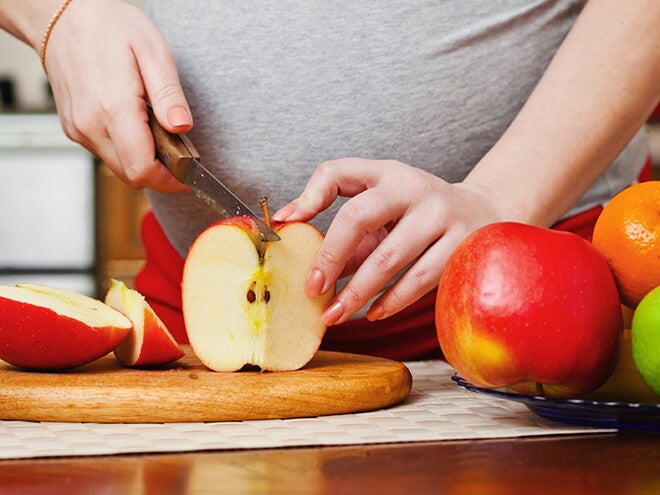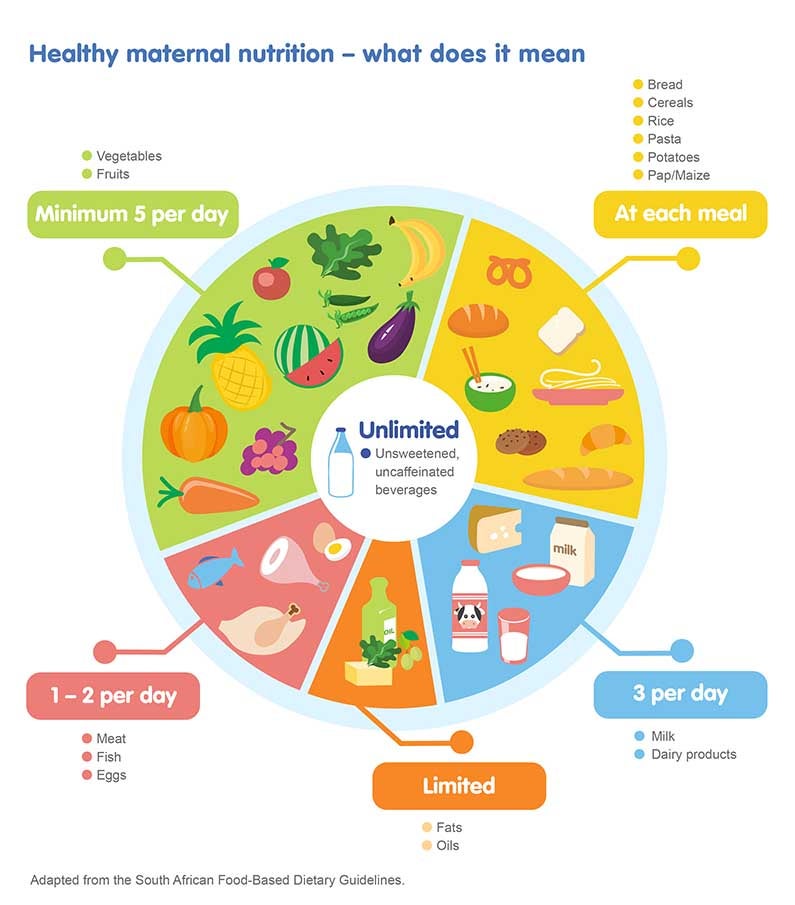
Eating for two doesn’t mean eating twice as much food, but it should mean making your food work twice as hard.
Make every kilocalorie count by choosing nutrient-dense foods, in other words get more bang for your calorie buck. By choosing a variety of food from all food groups, you can be assured of a well-balanced diet. But what if you have no appetite some days or occasionally feel nauseous? Remember, a quality diet over several days is what counts, not meal by meal.
What’s the right plan for me?
These food group guidelines, are an easy way to get started on a healthy pregnancy diet. Of course, your beginning weight, height, age, stage of pregnancy and the number of children you are carrying will determine how many kilocalories and how much food you will need.
Typically a woman’s energy requirements don’t increase during the first 3 months of pregnancy. But she will need about 350 kilocalories extra each day after first 3 months.

| Nutritional recommendations during pregnancy | ||
|---|---|---|
| Vegetables | 5 serves/day |
During pregnancy, make sure that fresh vegetables are carefully washed to eliminate any soil traces either before cooking or before placing in a home-made salad. Cook frozen vegetables, do not eat uncooked. |
| Fruits | 2 serves/day |
During pregnancy, make sure you wash fresh fruit well before eating. |
| Grain and wholegrain foods including breads, cereals, potatoes, rice and pasta | 8.5 serves/day |
|
| Milk and dairy products | 3.5 serves/day |
During pregnancy, only eat pasteurised dairy products. |
| Lean meats and poultry, fish, eggs, nuts and seeds | 3.5 serves/day |
|
| Fats and oils | Limit consumption |
|
| Sweets | Limit consumption |
During pregnancy, try and go for fruit instead of sweet treats (cakes, biscuits etc.) |
| Drinks | Limit consumption |
During pregnancy and breastfeeding it is recommended to not drink any alcohol at all. |
| Salt | Limit consumption |
|
| Physical activities | At least 30 minutes’ walk everyday | During pregnancy, maintain your normal physical activity, except those which represent a risk of falling or injury. You should avoid any contact or competition sports. During pregnancy and breastfeeding, do not begin any new strenuous physical activity. |
What is on your plate?
Here is a quick reference table which summarises what these key nutrients do and in which foods to find them
| Nutrient | For | From |
|---|---|---|
| Protein | Important for growth and development of muscles and bones | Meat, fish, eggs, cheese, dairy, legumes |
| Carbohydrates | Supplies energy | Pasta, rice, bread, cereal, potatoes, porridge/pap |
| DHA (docosahexaenoic acid) | Important for baby’s brain and eye development | Fish, Omega 3 fatty acid supplements |
| Probiotics | Contribute to a healthy gut flora | Probiotic products such as yoghurt containing probiotics, probiotic supplements |
| Vitamins | For | From |
|---|---|---|
| Folic acid | Reduces risk of foetal neural tube defects | Dark green leafy vegetables, dried beans, nuts, fortified breads and cereals |
| Vitamin B1 (Thiamine) | Important for energy production and carbohydrate metabolism | Meat, potatoes, wholegrain products |
| Vitamin B2 (Riboflavin) | Important for transport of iron and nervous system function | Dairy products, fortified breads and cereals |
| Vitamin B12 | Important for red blood cell formation and brain function | Fish, meat, poultry, dairy |
| Vitamin C | Important for immune system, collagen synthesis | Oranges, Naartjies, Gauva, tomato, kiwi fruit, broccoli |
| Vitamin A | Important for skin structure and visual function | Carrots, spinach, other yellow vegetables and fruits, eggs and liver |
| Vitamin D | Building strong bones and teeth | Sunlight, fish, egg yolks and fortified milk |
| Vitamin E | Protects against free radical damage | Wheat germ canola/olive oils, nuts and seeds |
| Minerals and trace elements | For | From |
|---|---|---|
| Calcium | Important for bone and teeth formation | Milk, cheese, dairy products, bony fish (pilchards, legumes |
| Magnesium | Regulates energy metabolism, nerve transmission, muscular contraction | Nuts, green vegetables, legumes |
| Iron | Important for oxygen transport and blood formation | Red meats, organ meat, fortified grains, bread and certain cereals |
| Iodine | Production of thyroid hormones and brain function | Fish, iodized salt |
| Selenium | Antioxidant, maintenance of hair and nails | Seafood, poultry, eggs |
| Zinc | Cell division, immune system | Meat, poultry, dairy products, fish |